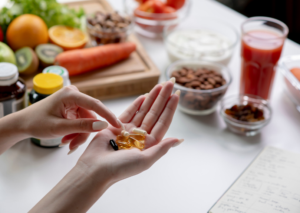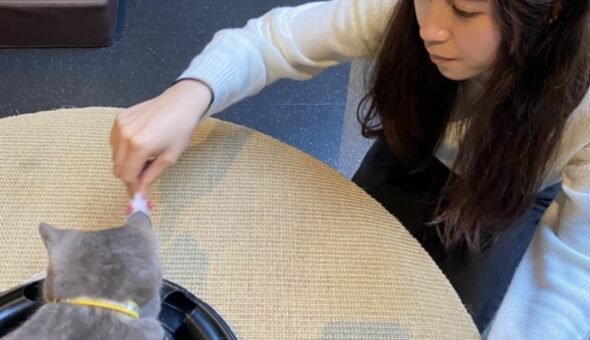With the cold weather taking a firm grip now, it’s becoming increasingly harder to avoid those winter illnesses that circulate this time of year. You’ll be very lucky if you manage to dodge them completely. Go on the internet and you will find plenty of advice about staying healthy over winter, everything from taking cold showers to hot saunas. But here are a few easy tips to help you keep as healthy as possible this winter, without going to extremes.
1. Boost Your Vitamin Supply
Try to eat a healthy diet with food rich in vitamins. In particular, this time of year you need to eat plenty of :
- Vitamin A: found in cheese, eggs, fish, yellow fruits, and yellow and red vegetables, great for boosting your auto-immune system.
- Vitamin C: found in citrus fruits, berries and vegetables, protects your cells and maintains healthy skin, bones and cartilage.
- Vitamin E: found in plant oils, nuts, seeds and wheatgerm, strengthens your body’s natural defences against illness and infection.

If you find yourself going down with lots of coughs and colds, it might be worth talking to a pharmacist about taking extra vitamin supplements. You can find pharmacists at any pharmacy where prescriptions are dispensed (such as Boots in Bath), they are professionally trained to help treat and prevent minor ailments.
2. Get outside
When it’s cold and wet outside it’s particularly tempting to stay indoors. However, that’s not the best thing for your physical or mental health. Your body needs vitamin D to keep your bones, teeth and muscles healthy. Although vitamin D is found in a small number of foods like oily fish, red meat and egg yolks, by far the best way to get vitamin D is through sunlight on the skin. Even then, during the winter months, most people will struggle to get enough. So, the Government advises taking a daily vitamin D supplement between October and March.
Lack of sunlight has also been linked to a condition called SAD (Seasonal Affective Disorder). Symptoms of SAD include a persistent low mood, difficulty concentrating, feeling lethargic or sleepy during the day and irritability. So getting outside as much as possible is essential. Try to invest in warm waterproof clothes and take a short walk outside every day, regardless of the weather. Sit near a window where possible and if you are really struggling invest in a SAD lamp.
People who are used to living in climates where there are more hours of sunlight in the winter are particularly susceptible to SAD and vitamin D deficiency.
3. Exercise and stay active
Exercising helps the body to adapt to seasonal changes, and helps mental health by increasing endorphins and decreasing stress hormones like cortisol. It doesn’t matter if you exercise indoors or outdoors, you get benefits from both. There is plenty of evidence to suggest that exercising in the cold builds more resilience to colds and infections, it also burns off more calories and can lead to stronger respiratory muscles. Providing you don’t have asthma or any other serious medical condition, running outdoors in the winter can be hugely beneficial.
If exercising outside is your thing or you are a complete beginner and want to try it, then the Bath Skyline Park Run comes highly recommended. This is a 5km course overlooking Bath which you can walk, run or jog. It takes place every Saturday, is completely free and starts very close to the University entrance.

If being outside longer at this time of year is too much to bear for you, then you can exercise indoors. Don’t forget that you can use your free Student Sports pass to get access to the swimming pool, tennis and badminton courts in the STV and there are a variety of exercise classes on at reduced rates.
4. Dress warmly
There is a saying in Scandinavian countries that there is no such thing as bad weather, just bad clothes. Keeping warm is essential during the winter. Too cold and your body finds it harder to fight off viruses; too hot and you can easily become dehydrated (especially in centrally heated rooms). The key to maintaining an even warm temperature is layers. Big warm coats are great for when the weather is really icy, but often too hot for indoors. How often have you put on a big coat on a cold morning and then found you are sweltering as soon as you get into a lecture theatre, but too cold if you take it off? If you are darting in and out of buildings, it is much better to have several layers that you can adjust accordingly.
Also, don’t neglect your footwear. Make sure it’s completely waterproof, as spending all day with wet feet is not only not fun but also bad for your toes and your body temperature. When it’s icy make sure your shoes have a good grip too. The hills around Bath can get very slippery!

If you haven’t got the right gear, there are plenty of shops that specialise in winter clothing. However, if you want to save a lot of money, it’s worth checking out the charity shops in Bath. A large number of students donate good quality winter clothes to the charity shops in Bath when they leave in the summer – you can pick up some excellent bargains if you shop around!
5. Stay hydrated
With all the rain in winter, you can be forgiven for not wanting any more water! In summer, we are all very good at making sure we drink enough, but not so in winter. Keeping your body hydrated throughout the year is essential. In winter our bodies can easily become dehydrated without us noticing – warm clothing can make us over hot and centrally heated buildings don’t help.
Don’t fancy water on its own? Then hot water with lemon, herbal teas or hot squashes can be an excellent alternative this time of year.
If you do find yourself succumbing to those pesky winter bugs, then it is vital to keep your fluids up. Your body will recover much quicker if you drink plenty.
And finally….
Winter colds are quite common in the UK and unless you develop a chest infection or become really ill, doctors are unlikely to prescribe you antibiotics, no matter how bad you feel. If you do get ill, it is likely to last for about a week. Drink plenty of water, keep yourself warm and seek advice on self-medication from a pharmacy.
Respond



